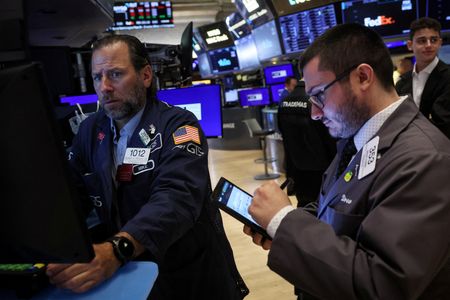By Ankika Biswas, Lisa Pauline Mattackal and Carolina Mandl
(Reuters) -U.S. stocks ended weaker on Friday after an early rally fizzled as investors digested in-line inflation data and weighed political uncertainty after the U.S. presidential debate.
Nike had its steepest one-day fall in over two decades after a gloomy forecast.
“I don’t think the inflation number changes much because the Federal Reserve has been pretty serious about their 2% target and remains disciplined,” said Ann Miletti, Allspring’s head of active equity.
Data showed U.S. monthly inflation was unchanged in May, an encouraging development after strong price increases earlier this year raised doubts over the effectiveness of the Fed’s monetary policy.
The Commerce Department report also showed consumer spending rose marginally last month, fueling optimism that the U.S. central bank could engineer a much-desired “soft landing” for the economy.
Bets on a rate cut in September rose to 66% after the personal consumption expenditures price index release, LSEG FedWatch data showed.
Traders have maintained bets on two cuts despite Fed projections of just one this year, as they hope inflation will keep cooling.
The first debate on Thursday between U.S. President Joe Biden and Republican rival Donald Trump also weighed on stocks, said Thomas Martin, senior portfolio manager at Globalt Investments, citing the incumbent’s shaky performance.
“People are trying to think about what’s going to happen with the presidential election. So instead of uncertainty decreasing after the debate, it’s increased,” he said.
Treasury yields reversed early losses to end higher, adding pressure on some megacap stocks.
San Francisco Fed President Mary Daly acknowledged the cooling inflation, and noted that it is “good news that policy is working.” Fed Governor Michelle Bowman said the central bank would follow its own path as its inflation goal has yet to be reached.
The S&P 500 energy and real estate were the top performers, up 0.42% and 0.62%, while utilities and communications services fell 1.08% and 1.63%, respectively.
Nike slumped 19.98% after forecasting a surprise drop in fiscal 2025 revenue, weighing on the broader consumer discretionary sector.
The Dow Jones Industrial Average fell 41.12 points, or 0.11%, to 39,122.94. The S&P 500 lost 22.57 points, or 0.41%, at 5,460.30 and the Nasdaq Composite dropped 126.08 points, or 0.71%, to 17,732.60.
Volume surged toward the closing bell when the FTSE Russell finalized the reconstitution of its indexes. It was the second biggest daily volume of the year.
The S&P 500 and the Nasdaq indexes registered quarterly gains of 3.9% and 8.3%, respectively. The Dow dropped 1.7%, highlighting the divergence between the more tech-heavy indexes and the rest of the market.
Among individual stocks, optical networking gear maker Infinera jumped 15.78% after Nokia said it would acquire the company in a $2.3 billion deal.
Advancing issues outnumbered decliners by a 1.29-to-1 ratio on the NYSE, which had 271 new highs and 75 new lows.
The S&P 500 posted 16 new 52-week highs and one new low while the Nasdaq Composite recorded 58 new highs and 139 new lows.
(Reporting by Ankika Biswas and Lisa Mattackal in Bengaluru; Editing by Maju Samuel and Richard Chang)





